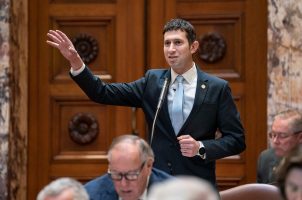Texas Sports Betting Supported by Key Republican
Posted on: February 6, 2023, 09:06h.
Last updated on: February 7, 2023, 01:24h.
The effort to bring mobile sports wagering to Texas has the support of a key Republican state senator.

On Monday, State Sen. Lois Kolkhorst (R-Brenham) introduced Senate Bill 715 (SB 715) and Senate Joint Resolution 39 (SJR 39) in an effort to bring regulated mobile sports betting to the second-largest US state.
Kolkhorst authoring sports betting legislation could be critical to sports betting’s chances of coming to life in Texas. That’s because she’s an ally of Lt. Gov. Dan Patrick. Patrick, also a Republican, is president of the Texas State Senate, and has long opposed gaming expansion in the state.
I introduced SB 715 and SJR 39 because Texas needs to bring security and safety into the world of mobile sports betting,” Kolkhorst said in a statement. “It makes sense to reign in all of the illegal offshore betting and keep sports wagering funds here in Texas.”
Kolkhorst’s effort is supported by companion legislation in the state House introduced by Rep. Jeff Leach (R-Plano). The bills introduced by the legislators have some bipartisan support, and would legalize sports betting in the state via a constitutional amendment. Comparable to bills introduced two years ago that ultimately failed, the Kolkhorst and Leach bills propose a 10% tax on sports betting revenue.
Texas Sports Betting Bills Supported by Big Names
It’s not yet clear exactly how, or if, Kolkhorst’s friendship with Patrick will pay off in the form of the sports betting bills coming to the Senate floor. But there’s no denying the issue is supported by big names outside the political realm.
Earlier Monday, Houston Texans owner Cal McNair and Houston Rockets boss Tilman Fertitta issued statements supporting the Kolkhorst and Leach bills. Fertitta already has direct ties to the gaming industry, as his Feritta Entertainment owns the Golden Nugget casinos and a 6.1% stake in Wynn Resorts (NASDAQ: WYNN). He also sits on the board of DraftKings (NASDAQ: DKNG), which is one of the largest online sportsbook operators in the US.
The aforementioned bills were introduced less than a month after Dallas Cowboys owner Jerry Jones told a local sports radio station the time is appropriate for Texas to consider sports betting.
“Sports betting is a very popular form of entertainment,” Fertitta said in a press statement. “Sports fans enjoy placing bets on their favorite sports because it brings them closer to the team and puts them in the game. No one wins with an illegal market as robust as the one in Texas, and I applaud Senator Kolkhorst and Representative Leach for recognizing the need to address the illegal market in Texas.”
All of the professional sports franchises in the state, as well as the PGA Tour and Texas Motor Speedway, are members of the Sports Betting Alliance, which also includes sportsbook operators Barstool Sportsbook, BetMGM, DraftKings, and FanDuel. Former Gov. Rick Perry (R-TX) is a spokesman for the group.
Texas Sports Betting Separate from Casino Push
In addition to the sports betting bills, some Texas lawmakers are pushing legislation to allow the state to have casino hotels — something gaming companies favor because of the state’s compelling demographics and a booming population.
Some experts view the odds of Texas approving casinos and sports betting in a single legislative session as slim, and opposition to gaming venues is an obvious hurdle. As such, the bills introduced by Kolkhorst and Leach are specific to sports wagering. Likewise, the Sports Betting Alliance deals only with sports wagering, and isn’t actively taking a stance on casinos in Texas.
Lawmakers backing casinos and sports betting, or both, need to ready some compelling arguments. That’s because many of the states that recently embraced mobile sports wagering, such as Illinois and New York, needed the cash. That’s not the case in Texas, where this year’s budget surplus is forecast to be $32.7 billion.
Related News Articles
Minnesota Mulls Another Sports Betting Bill
San Antonio Spurs Owner Peter Holt Supports Texas Sports Betting
Minnesota Sports Betting Bill Scores First Victory
Most Popular
Mirage Las Vegas Demolition to Start Next Week, Atrium a Goner
Where All the Mirage Relics Will Go
Most Commented
-
Bally’s Facing Five Months of Daily Demolition for Chicago Casino
— June 18, 2024 — 12 Comments -
Chicago Pension Mess Highlights Need for Bally’s Casino
— July 2, 2024 — 5 Comments
















No comments yet